
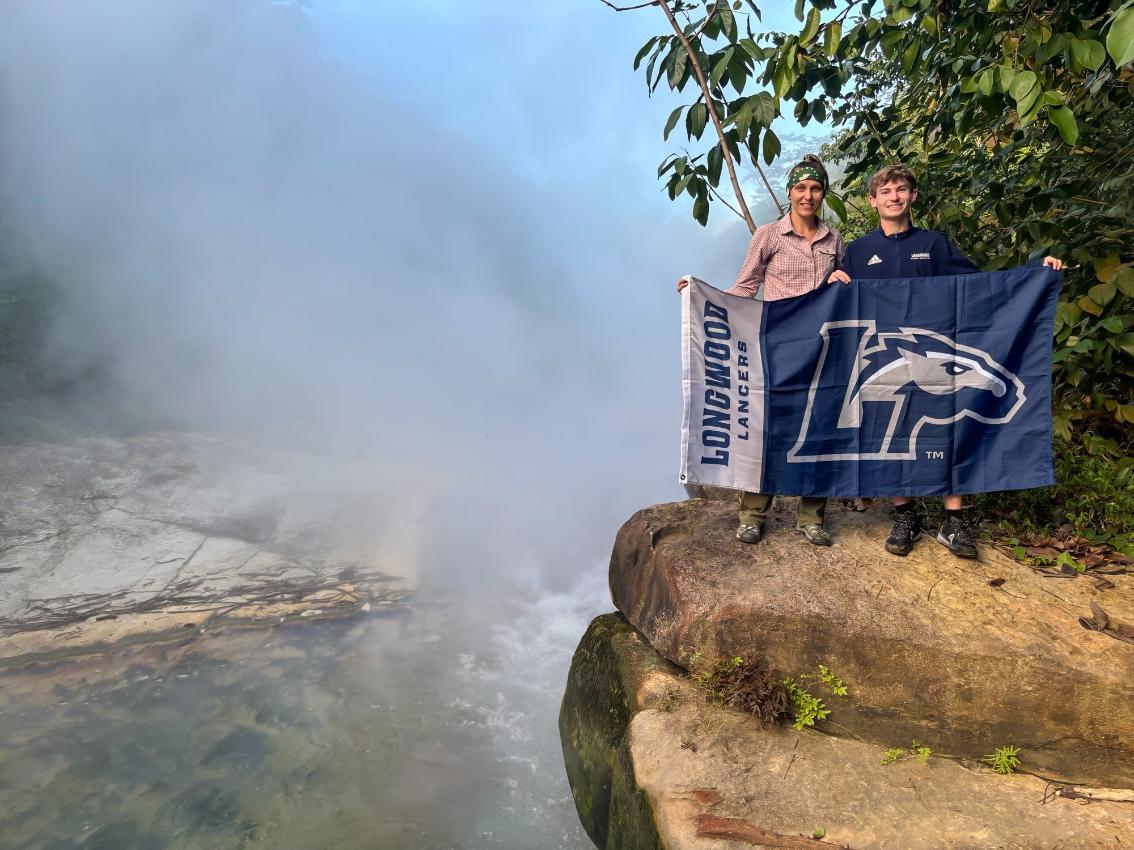
Senior biology major Andrew Schaefer ’26 attended the 2024 Virginia Association of Science Teachers (VAST) Conference seeking career insights and networking opportunities. What he didn’t expect was an invitation from a fellow Lancer to join an eye-opening research expedition in the Amazon Rainforest.
“I met an alum who had just gotten back from Antarctica where she was studying penguins,” Schaefer said. “I attended one of her talks and asked her afterwards how she got into field research. Her response to me was, ‘I’m going to Peru if you want to come.’”
That woman was fellow Lancer Becky Schnekser ’05, who describes herself as an "educator-explorer" dedicated to exposing more educators, like Schaefer, to field research. Those experiences, she says, provide an incomparable perspective that teachers bring back to their classroom, share with their students, and, in turn, ignite a deeper interest in science and how it relates to the real world.
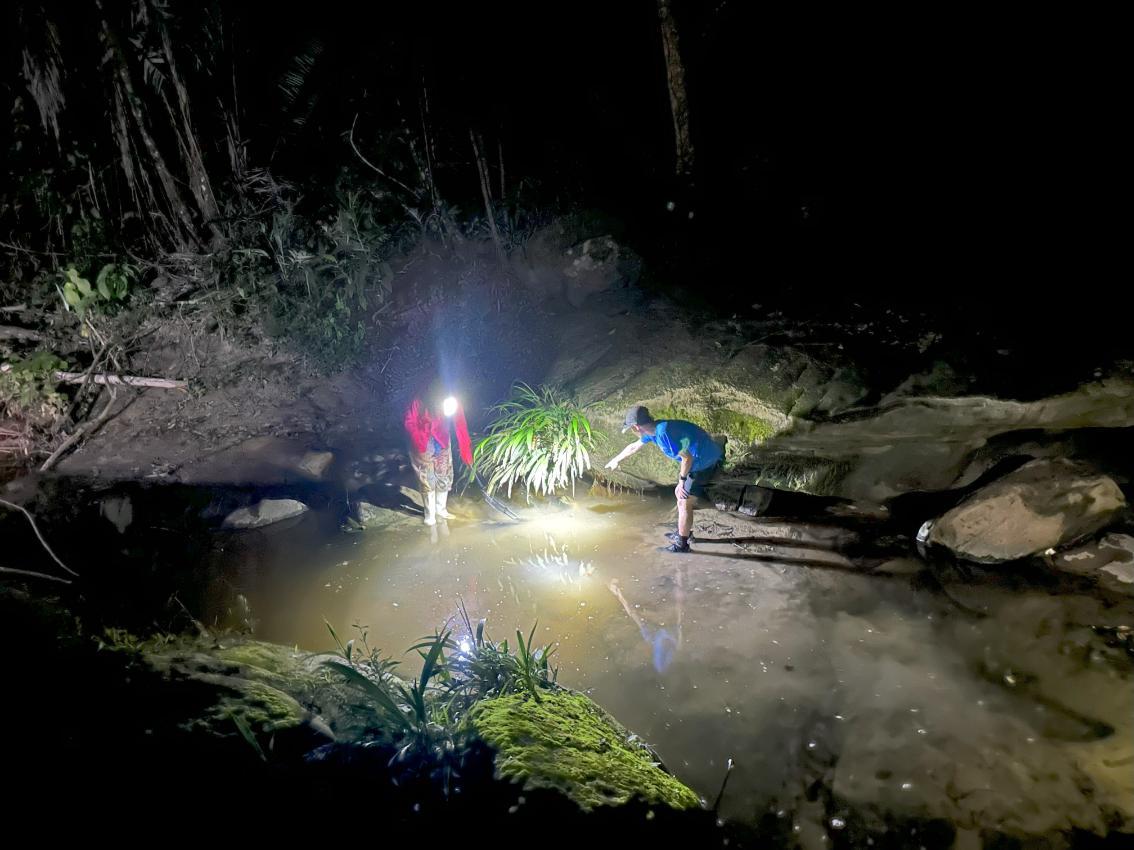
I think it's our job as teachers to spark something in our students. And in order to give them their sparks, I have to have a spark myself.
Becky Schnekser ’05 Tweet This
“I think it's our job as teachers to spark something in our students,” she said. “And in order to give them their sparks, I have to have a spark myself.”
An elementary teacher, Schnekser has found her spark doing field work around the world. Her students know all about her research on penguins in Antarctica and tortoises in the Galapagos. It took mere minutes for her to share that spark with Schaefer.
“When he said he was from Longwood, you can only imagine my excitement,” Schnekser said. “After talking for a bit, the idea to invite him just popped into my head. And on the spot, he said, ‘Yeah, of course.’ From there, we just started planning and looking for ways to fund his trip. Six months later, we were in the Amazon.”
The following June, Schaefer joined Schnekser and several dozen researchers and educators on a two-week trip to study The Boiling River in Peru. Located near the city of Pucallpa and natively called the Shanay-timpishka, the river is an anomaly of geothermal activity that recently became a hotbed for scientific research. Despite temperatures that can exceed 180 degrees Fahrenheit and literally cook wildlife alive, the river’s closest volcano is more than 400 miles away. It’s the lack of volcanic activity that has intrigued scientists like Schnekser to research what makes the river tick…or, rather, boil.
Thrown Into the Fire
Research by The Boiling River Project — of which Schnekser has been a part since 2018 and Schaefer joined as a member of the 18th cohort this past June — focuses on nearly every aspect of the river and its surrounding ecosystem. That includes water composition, temperature fluctuations, surrounding flora and fauna, geology, and even the indigenous population that depends on Shanay-timpishka for everything from drinking water to bathing and sanitation.
In the group’s most recent trip, Schaefer contributed to that ongoing research as part of the drone team, whose role was to map the area for both scientific and exploratory purposes.
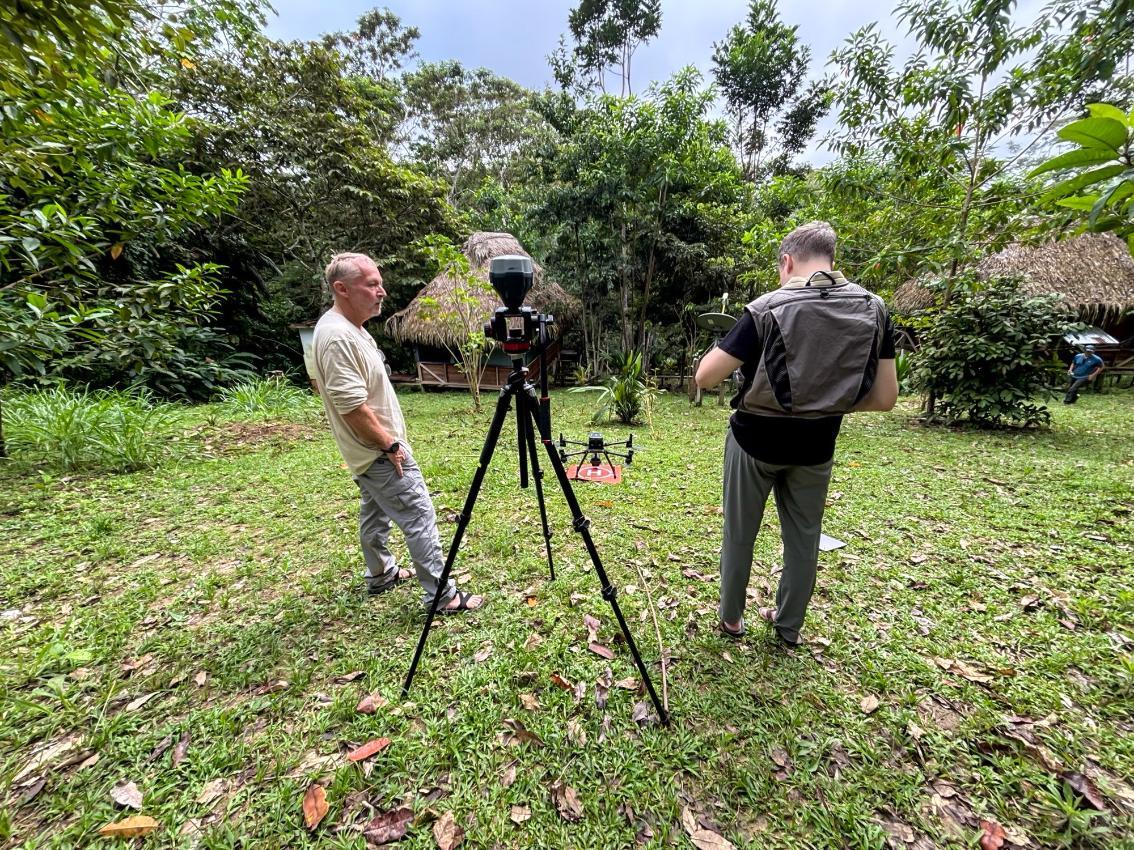
I actually had no experience flying a drone. The team lead told me he needed help and said everybody else was doing other things. He asked if I wanted to team up on the drone project; I said yes, and he basically said, ‘Cool, you’re on my team now.’
Andrew Schaefer ’26 Tweet This
“I actually had no experience flying a drone,” Schaefer said. “The team lead told me he needed help and said everybody else was doing other things. He asked if I wanted to team up on the drone project; I said yes, and he basically said, ‘Cool, you’re on my team now.’”
With that, Schaefer was handed the controls to a $50,000 drone equipped with three types of imaging capabilities. By using standard video, 3D mapping, and canopy-penetrating LiDAR technology — and special software that consolidated all of the information — Schaefer and the team were able to create a 3D model of the area surrounding the river.
“The jungle was so dense that we could only walk so far, but LiDAR allowed us to see what the ground looked like in front of us or behind us,” Schaefer said. “You could see a ridge here, a cliff there; it broke it all down so we knew what was around us.”
A Broader Purpose
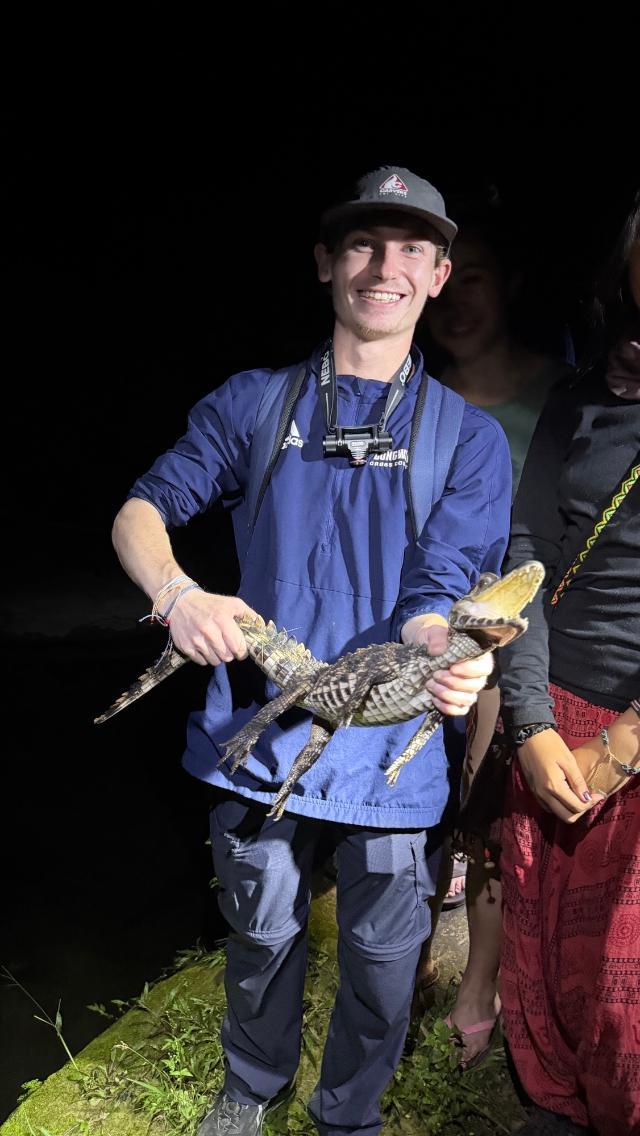
That work contributed significantly to The Boiling River Project’s broader goal: to protect the river through scientific research and educational initiatives and, in turn, preserve the natural ecosystem of the Amazon. It’s a mission with which Schnekser has become intimately familiar in the six field seasons she has joined and one that she has worked to share with educator-scientists like Schaefer — or, as Schnekser labels them, “educator-explorers.”
A Ph.D candidate at Prescott College in Prescott, Arizona, Schnekser’s academic research focuses on outdoor learning for pre-service teachers like Schaefer.
“I'm an elementary teacher, so my entire career I've taught a lot of different subjects that I’m not an expert in,” Schnekser said. “I feel like the best way to learn that content is through experiential education — going out and doing those things — so that I have a better understanding and I can bring that to my students.”
I feel like the best way to learn that content is through experiential education — going out and doing those things — so that I have a better understanding and I can bring that to my students.
Becky Schnekser ’05 Tweet This
Since her inaugural Boiling River trip in 2018, Schnekser has conducted research on four different continents, including trips to Antarctica, the Galapagos Islands, Belize, Tangier Island, and Iceland. In 2021, she also authored the book “Expedition Science: Empowering Learners Through Exploration,” which provides ideas and small-scale fieldwork activities that teachers can incorporate into their lessons.
However, the ultimate goal, says Schnekser, is to get professional educators into the field to experience scientific research first-hand — whether they’ve been teaching for decades, like Schnekser, or have yet to command a classroom of their own, like Schaefer.
“A big goal of mine for the Boiling River Project is to build a program or a fellowship for pre-service teachers,” she said. “This past trip, it all kind of happily came together with Andrew coming down. He was amazing, and he kind of tested out this idea. It was very successful.”
Sharing a Spark
Schaefer was the first pre-service teacher to join the Boiling River Project, serving as the pilot case for Schnekser’s burgeoning initiative. Pre-service teachers — students still in training to become fully-fledged educators — may have less exposure to unique learning experiences like the Boiling River Project, which is something Schnekser and Longwood science education faculty seek to change.
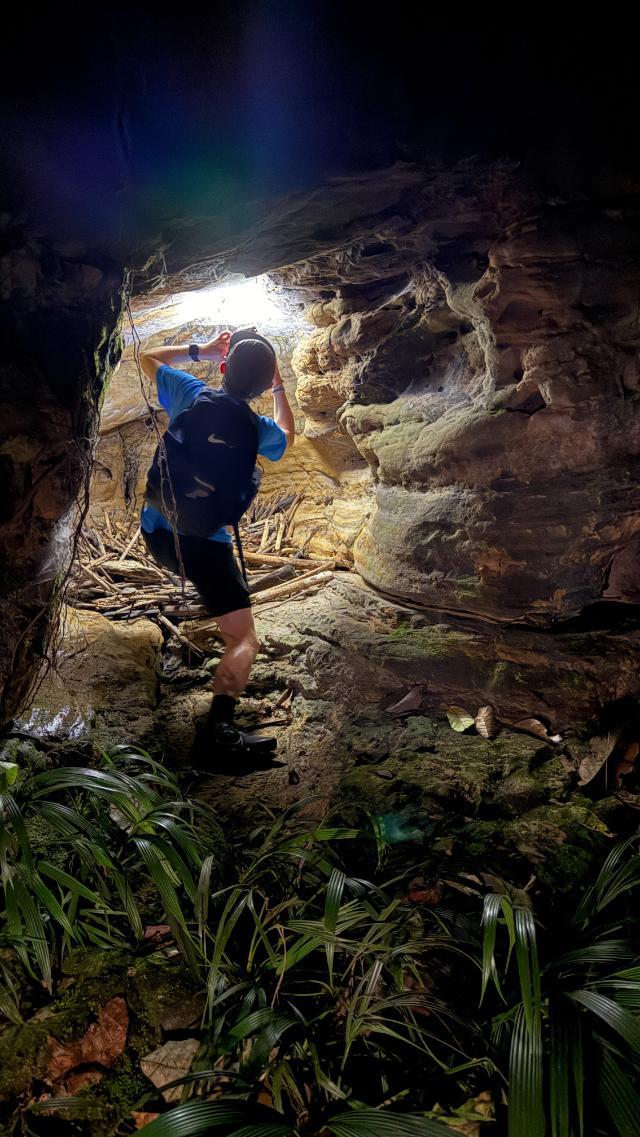
“[Field work] is really invaluable for educators,” said Dr. Tyler St. Clair, Longwood associate professor of science education. “Studying a particular place in the world allows them to see what's going on there, how they might be connected to it, and gives them an opportunity to unpack and study the science. It provides a global studies lens on teaching science topics; it gives you the ‘why’ behind why you'd want to be learning something.”
But even as he remains at least a year away from having a classroom to call his own, Schaefer will already have a platform to share what he gained from his trip to Peru. In addition to creating and sharing classroom materials inspired by the trip, he and Schnekser will co-present about their Boiling River experience at the upcoming VAST Conference in November — revisiting the same setting where they first met one year prior.
However, this time instead of being part of Schnekser’s audience, Schaefer will share the stage. In fact, Schnekser plans to let him have the full spotlight.
“I’m letting him take the driver’s seat,” Schnekser said. “I'll be there for moral support, but it's my turn to get out of the way.”
Their presentation will focus not just on the research they conducted but also on the example it sets for the long-term payoff of getting educators into the field for research, as well as educational materials that teachers can use in their classrooms. The audience will be made up of professional K-12 educators, school administrators, and pre-service teachers like Schaefer — all potential “educator-explorers” in waiting.
Additionally, St. Clair and another Longwood student, Moorea Whitfield ’26, will present separately on another research project they’ve undertaken on campus, giving Longwood strong representation at the statewide event.
And as far as what grade-level students Schaefer will share his first spark with, he’s eyeing a career as a high school biology teacher.
“I would love to teach high school, and being a bio teacher, I’m probably looking at 10th or 11th grade,” Schaefer said. “In the long term, if I choose to do more school and try to get my doctorate, maybe higher education. But for now, I’m just looking to get into a classroom and present what I know and how I can relate that information to my students.”
Thanks to that initial connection with Schnekser, he’s ready to do just that…with a spark.
